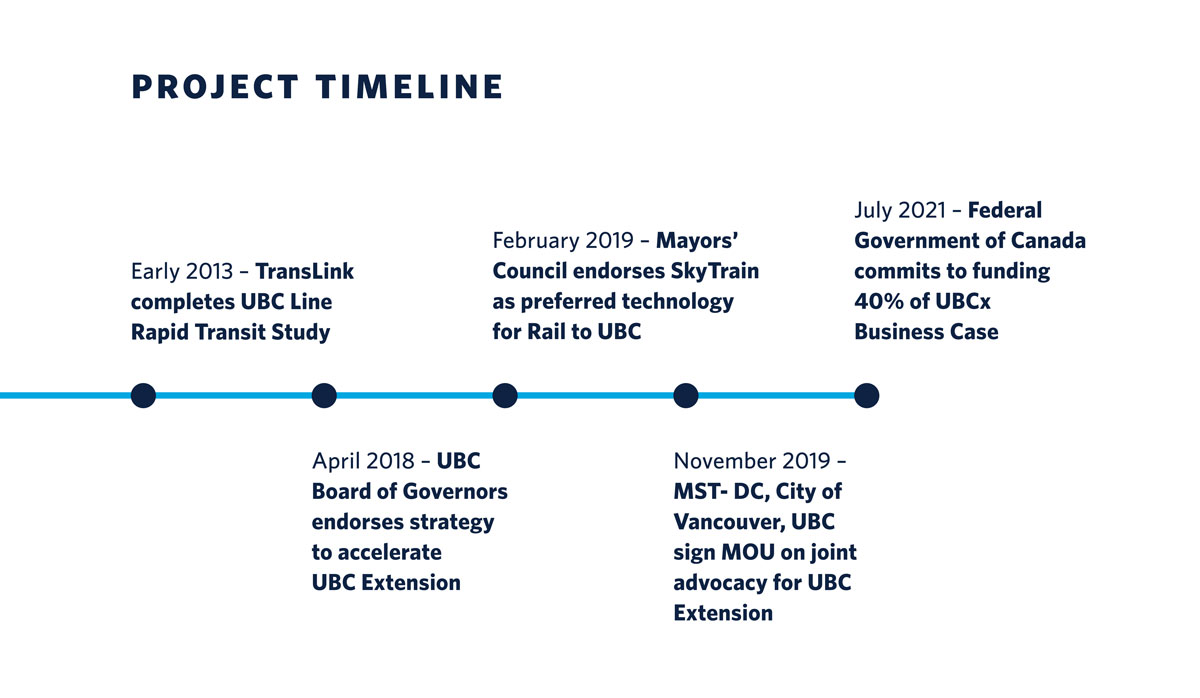About the Project

Making Metro Vancouver transit better
Metro Vancouver is a thriving region set to grow by 1.5 million people and more than 500,000 jobs in the next 25 years. As the region grows, building more housing integrated with an expanded regional transit network, including the extension of SkyTrain to UBC, is crucial.
A rapid rail connection to UBC has been part of the long-term vision for Metro Vancouver’s transit strategy for years and it’s part of TransLink’s Transport 2050 – the long-term transportation plan for the region. The Broadway Subway project—extending the Millennium Line SkyTrain to Arbutus Street—is an important start and is now under construction but, on opening day in 2027, almost 4,000 passengers per peak hour will be left waiting for overcrowded buses to get to and from campus. Now is the time to extend SkyTrain all the way to UBC and complete this long-standing regional transit priority.

Extending SkyTrain to UBC is good for the region
Connecting UBC’s Vancouver campus to the broader community will have tremendous economic, social and environmental benefits for people living throughout the lower mainland. It will:
- link the region’s education, employment, research, innovation and health centres;
- improve access to affordable housing by opening housing options across the entire length of the line;
- increase sustainable transit usage along the entire length of the Broadway corridor, reducing congestion, GHG emissions and air contaminants while improving personal health and wellbeing; and,
- enable people in communities across Metro Vancouver to engage with the educational, research, cultural and employment opportunities at one of Canada’s leading universities.
UBC is advocating for the Broadway Subway to be extended to the Vancouver campus now and is exploring a financial contribution towards the regional share of this project to accelerate its completion, provided the contribution does not affect funding for UBC’s academic mission.

A unique partnership behind the UBC SkyTrain Extension
Extending the SkyTrain through the Jericho Lands now jointly owned and being developed by Musqueam, Squamish and Tsleil-Waututh First Nations provides a notable step toward reconciliation in BC. The three nations are working with the community to develop an inspiring, progressive and sustainable new neighbourhood on the 90-acre Jericho Lands. Connecting this development to the UBC Extension will further integrate the socioeconomic development aspirations of these nations into Metro Vancouver long-term planning, while creating thousands of new housing units for the region. The City of Vancouver and UBC signed a memorandum of understanding with the Musqueam, Squamish and Tsleil-Waututh First Nations committing to close partnership in an effort to extend SkyTrain from Arbutus to UBC. Learn more about the partnership.
Metro Vancouverites say yes! to the project
In April and May of 2021, TransLink surveyed over 15,000 people from across Metro Vancouver and found that 92% of respondents support the extension of SkyTrain to UBC. People who live further from UBC, beyond the City of Vancouver, were even more likely to say they support the extension (93% support). Read the report and learn more about this current phase of work.
A poll commissioned by UBC also confirms that residents from across Metro Vancouver agree with the regional mayors. A full 82% of survey respondents said they supported extending the Millennium Line all the way to UBC and 60% said the extension should be considered a regional priority.
Planning is underway
In the fall of 2022, the Ministry of Transportation and Transit assumed leadership of the UBC Extension project and is currently advancing more detailed design and technical analysis as well as development of the business case and funding strategy.

Learn more about the project timeline and what’s happening now.
UBC remains committed to exploring a meaningful financial contribution
UBC is exploring a financial contribution to the regional share of the project, provided the contribution does not divert any funding from the academic mission. Funding will not be derived from the provincial operating grant, current endowments, research funding nor student tuition.
A UBC contribution to rapid transit could take many forms:
- Land for stations – Land for routes and stations comprise a major part of rapid transit costs. UBC could contribute land for stations on campus.
- Charges Collected from Developers – Local governments collect charges from developers to pay for the infrastructure and amenities that support growth. UBC collects charges from market land development, some of which could support rapid transit construction costs.
- Transit-Enabled Revenue – Rapid transit can help generate new revenue. For UBC, some revenue could come from land development as well as from more people accessing the campus for recreation, culture and services. This new revenue will only be realized with a SkyTrain connection to campus.